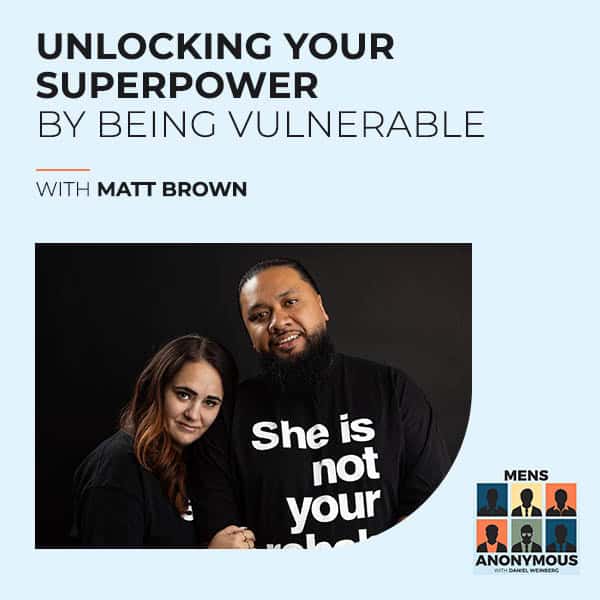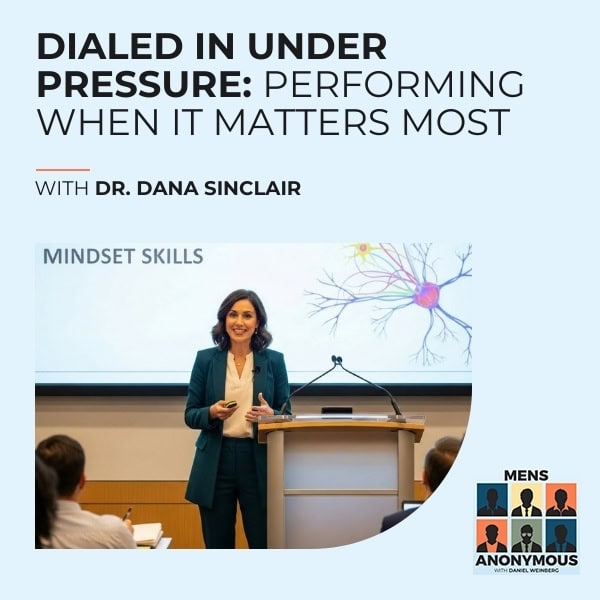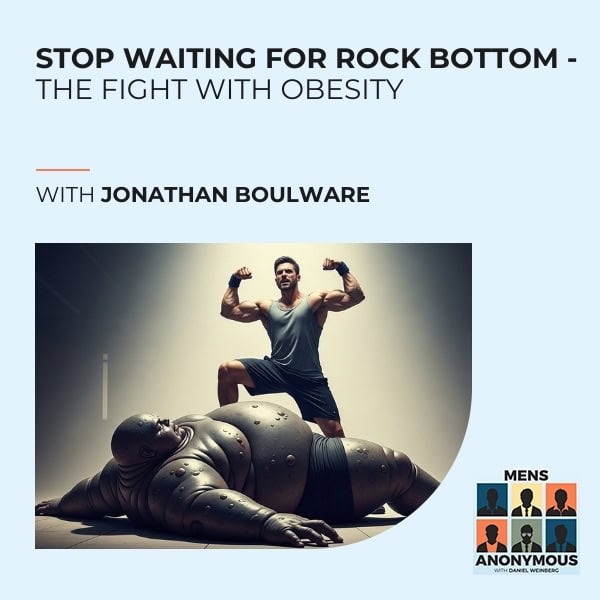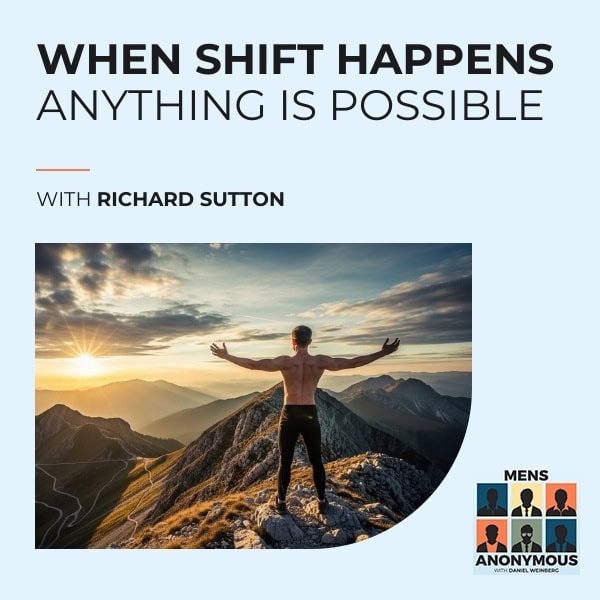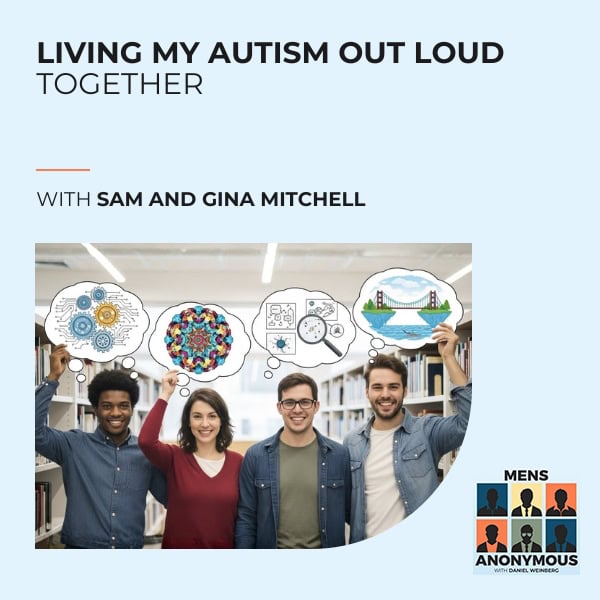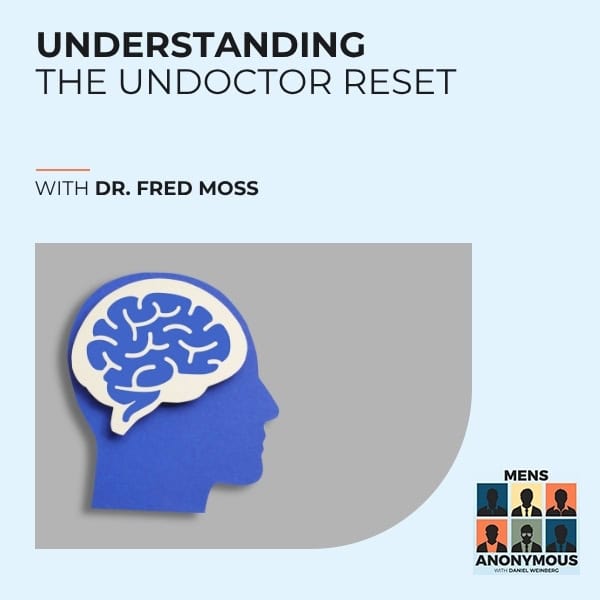
Men are often pressured to be vulnerable, show emotion, or express their genuine feelings without reservations. But once they do, they could unlock their superpowers and encourage others to embark on the same transformative experience. This is exactly what Matt Brown is doing through his anti-violence movement She Is Not Your Rehab. Joining Daniel Weinberg, he shares how he invites men to get into raw and vulnerable conversations that allow them to face their fears, address their trauma, and achieve inner healing. Matt also opens up about overcoming his own share of childhood trauma, family violence, and sexual abuse, which he has all turned into opportunities to spread inspiration to his fellow men.
—
Watch the episode here
Listen to the podcast here
Unlocking Your Superpower By Being Vulnerable With Matt Brown
On this episode, we have Matt Brown, founder of She Is Not Your Rehab. This man has an incredible story to tell. Not only is it an incredible story but he is an incredible man, and a young man at that. I wanted to give the guy a hug. It is so heartwarming, and the man has such incredible energy. I can’t wait for you to tune in to it. I love for you to drop some comments on the show and let me know what you think of Mens Anonymous.
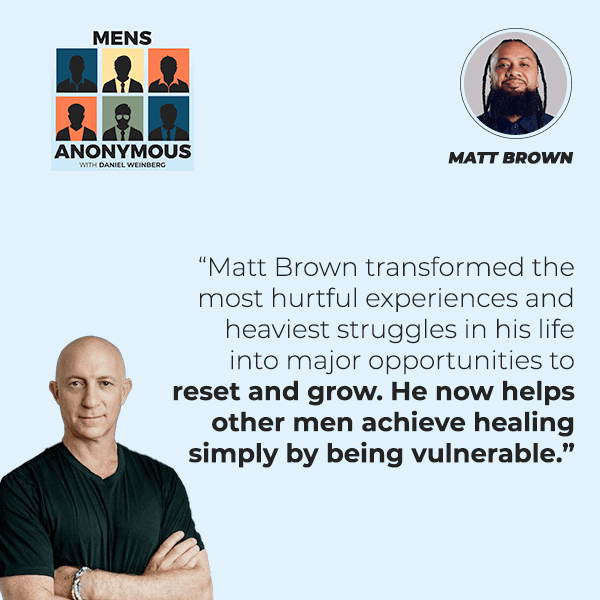
Matt, very excited to have you on the show. We’re going to have a lot to dig into. Where are you?
I’m currently in Ōtautahi, Christchurch, New Zealand.
A Little Boy In Survival Mode
Welcome, New Zealand. For the audience, I want to set the tone of this conversation. I think it’s important that you tell us a little bit about your upbringing and the experiences you had that put you on the journey and path that you’re on.
I was born here in New Zealand, in Auckland, our big city on the North Island of this beautiful country. I was raised down here on the South Island in Christchurch, which most would consider the greatest rugby city in the world. If I could describe my childhood in one word, I would describe it as unsafe. I loved my childhood. I loved hanging out with my brothers and my siblings. There were five of us boys all up, four brothers, and then I had three half-sisters. I had one sister who passed away at birth. Most of the time, there were about five of us boys in our household.
It was a very male, masculine, and dominant household. Growing up, I would describe my childhood as unsafe. By the age of ten, we had lived in every women’s refuge home here in Christchurch. My father was in and out of prison for domestic violence and family violence. He got out of jail or out of prison after doing a long leg-up in Auckland. He was offered a job down here in Christchurch, which is why we shifted to the South Island of New Zealand. The company that offered him a job moved our whole family down.
My father took us away from our home environment. South Auckland was where we were raised, which has the biggest population of Polynesians in the world. He moved us down to Christchurch, where there weren’t many people who looked like us. There weren’t many brown people, colored people, indigenous people. Our superheroes growing up watching on TV were rugby players. I grew up in an era when Jonah Lomu, whom I would consider one of the greatest All Blacks, made rugby internationally famous. Those were our superheroes.
Unfortunately for me, I wasn’t the best at sports. I gravitated more towards KFC and fried chicken. I loved hip-hop. I gravitated towards hip-hop, not because these Black and brown brothers and sisters were talking about pretty girls and fancy cars but because they were talking about their stories of pain and trauma where they grew up. This resonated with me. I connected to these stories. Watching my mum be subjected to violence on a daily basis was horrific. It became my normal. I remember waking up at 3:00 in the morning to my father pulling my mother down the hallway by her ear. The infamous movie, if you’ve ever seen Once Were Warriors.
When you’re talking, the way you’re describing small details, the first thing that comes to mind is Once Were Warriors, which is a very intense movie. It’s an incredible movie, but it shines a light on what you’re talking about, which is that’s a real thing.
I was ten years old when that film came out. We sat on the carpet on the floor in my lounge and watched it with my siblings. We laughed through the entire film. We thought it was a comedy because we would compare Beth Heke’s black eyes to my mum’s black eyes. Beth Heke’s got nothing on my mum’s black eyes because my mum would go to church with a bruised face and big black eyes, wearing her big sunglasses to hide her bruises. No one said or did anything. People knew the violence. People heard the violence. People witnessed the violence. No one ever spoke up.
Why do you think?
It’s the shame and the stigma around family violence. People believe that it’s not their issue or not their problem. You can only imagine what that does to young boys, growing up and witnessing your beloved mother be subjected to such violence, and watching your father, who is meant to be a superhero, project all this anger and pain onto the woman he supposedly loves. Growing up, I was confused about what a healthy masculine man looked like because all I ever witnessed was violence, abuse, and trauma. I ended up telling my story. In school here in New Zealand, everyone is tasked with doing a three-minute speech in English class. I stood up in front of my peers to do my three-minute speech, and I did my speech.
What age were you?
I was fifteen years old in secondary school. I talked about my story of family violence, growing up, watching family violence, being subjected to sexual abuse, and being raped at a young age. You could see the horror on my peers’ faces and the shock from my teachers. I remember feeling that anxiety, “What do these people think? What are my boys thinking?”
The pushback was real. My boys came up to me after and said, “The shit you’re talking about is our story, but you’re bringing shame to our culture. You’re dishonoring your mother and father by talking about it. You’re dishonoring our parents by talking about this stuff.” That didn’t sit well with me because I didn’t have many options. Think of a fifteen-year-old boy telling this story in his three-minute speech.
The courage. I don’t know how you did that. It’s not like you’re telling a therapist. You’re telling your class and your peers. That’s putting it all out there. There’s no other way to describe that.
When I look back, this young little Matt was in survival mode. He was asking for help and screaming for help. I didn’t have any other option. Option one was to tell my story and speak up. Option two was to keep it suppressed and take my own life. Suicidal ideation was a constant companion of mine growing up. That led me on this path of owning my entire story. The courage to own my story was hard. I left home at fifteen that same year because the violence was horrific.
Was there a catalyst or something? To be a fifteen-year-old child and to have the courage to lift the kimono on everything there in front of these people who aren’t necessarily your close friends but they’re your class peers, did someone advise you, encourage you, or recommend you? What was it that got you to muster up that courage?
It was a social worker in particular who I was seeing at the time. They didn’t ask me to leave. I was having these conversations that I wasn’t happy with my situation at home. Suicide was a real thing. When I say a real thing, I found myself sleeping on train tracks, hoping a train would come and free me while I was asleep. Believe it or not, suicide can be hard. It can be difficult when you do attempt it, trying to complete that thinking.
I reached out to our social worker. All he did was connect with me. He didn’t preach to me. He didn’t tell me what to do. He just sat and listened to me. I knew at a young age that this life that I was living was not what I wanted. I wanted different. It was windows like hip-hop. It was windows like the sports players, like the All Blacks, that gave me hope. There has to be something more than this life that I was living. I leaped, took the courage, and left home.
I moved into a boys’ home, where I found my feet and started trying to find and heal from a very young age. I started having these conversations with the boys that I was living with. I got into a trade job. I became a joiner by trade after school. I landed on barbering. I picked up some clippers. I was always cutting hair throughout high school, a haircut for a dollar pie. I would exchange with my boys at high school for lunch.
I fell in love with barbering through hip-hop. It was through watching my favorite rappers with their hairstyles and their fades. I loved the fashion style of hip-hop. I decided to pick up these clippers, went down to the Warehouse, which is similar to Kmart, and bought some Remington box clippers, which, on the box, said titanium blades. When these clippers touched Polynesian hair, they were blunt. I started with what I had. It went from cutting my boys in my neighborhood and it grew.
You had a physical barber shop where all these men would come.
I first started in a little barber tin shed, and then it grew into these big barber shops. That growth was thanks to my best friend at the time, Sarah, who is now my wife. We were good friends. She came on board and helped me grow this business, this barber shop. It was when I was cutting men’s hair, it started with men in the neighborhood to men from all different walks of life.
I started cutting men, construction workers, policemen, firefighters, lawyers, and still cutting the boys in the neighborhood who were selling and dealing. It was then I learned, as I was cutting these men’s hair, that they would trust me with their haircuts, but they would soon start trusting me with their stories. Vulnerability became a real thing. It started when I was vulnerable with my story, the fifteen-year-old boy.
The way you spoke, you gave them the opening or the invitation to be vulnerable about it because you went, “This is me.” I can see that.
When you’re vulnerable, you give permission for other people to be vulnerable. I soon learned that we were more alike than we were different. It didn’t matter whether you were white or brown, rich or poor. Shame was shame. Pain was pain. Unfortunately, it did not discriminate, no matter what your background was.
When you become vulnerable, you give permission for other people to be vulnerable. Share on XWhen I hear you talk and what you’ve gone through, you’re very calm and very gentle. You have an almost Zen-like energy. I can feel you’re very centered. I want to hear how you made that journey. How did you get there at such a young age, opening barbershops and talking to men?
It sounds like, for a very young man, there’s some point along the path where you’ve had a mindset shift. You’ve taken the trauma and the pain and turned it into a major opportunity to change your life. You almost took it as like, “This is my chance to reset,” in a very positive way. It sounds like a very mature and well-experienced young man to be able to get there. Can you walk us through how you get there?
It was the thirst for truth, liberation, and freedom. Having these conversations with so many men, when I was sitting here, cutting hair, and talking to the boys who were in gangs, who were selling drugs, who were in violent relationships, who didn’t know how to regulate their nervous system and would then transmit all this anger and pain onto those whom they so-called love, their partners, and their children, it didn’t make sense to me. I looked at our system. I looked at what was the available resources, and I thought, no one was coming to rescue us.
If we’re waiting for our government to come up with the right program and the right tools to help the men in my community, we will be waiting forever. The system wasn’t working. The system was created for us to stay in this victim poverty mindset. Seeing that and looking at myself, trying to find answers, truth, and freedom for myself, I had to come up with these solutions that would work for me. I didn’t set out to try and rescue my neighborhood or help men. I wanted to help myself. That’s how it turned out.
Practical Ways To Heal From Trauma
In learning how to help yourself, you’ve also gone into pay-it-forward mode. Can you hone in a little bit on maybe some of those things that you learned yourself in how to heal, like actual practical things that you put in place in your daily routine? I don’t know what you did, but can you get a little bit practical on us?
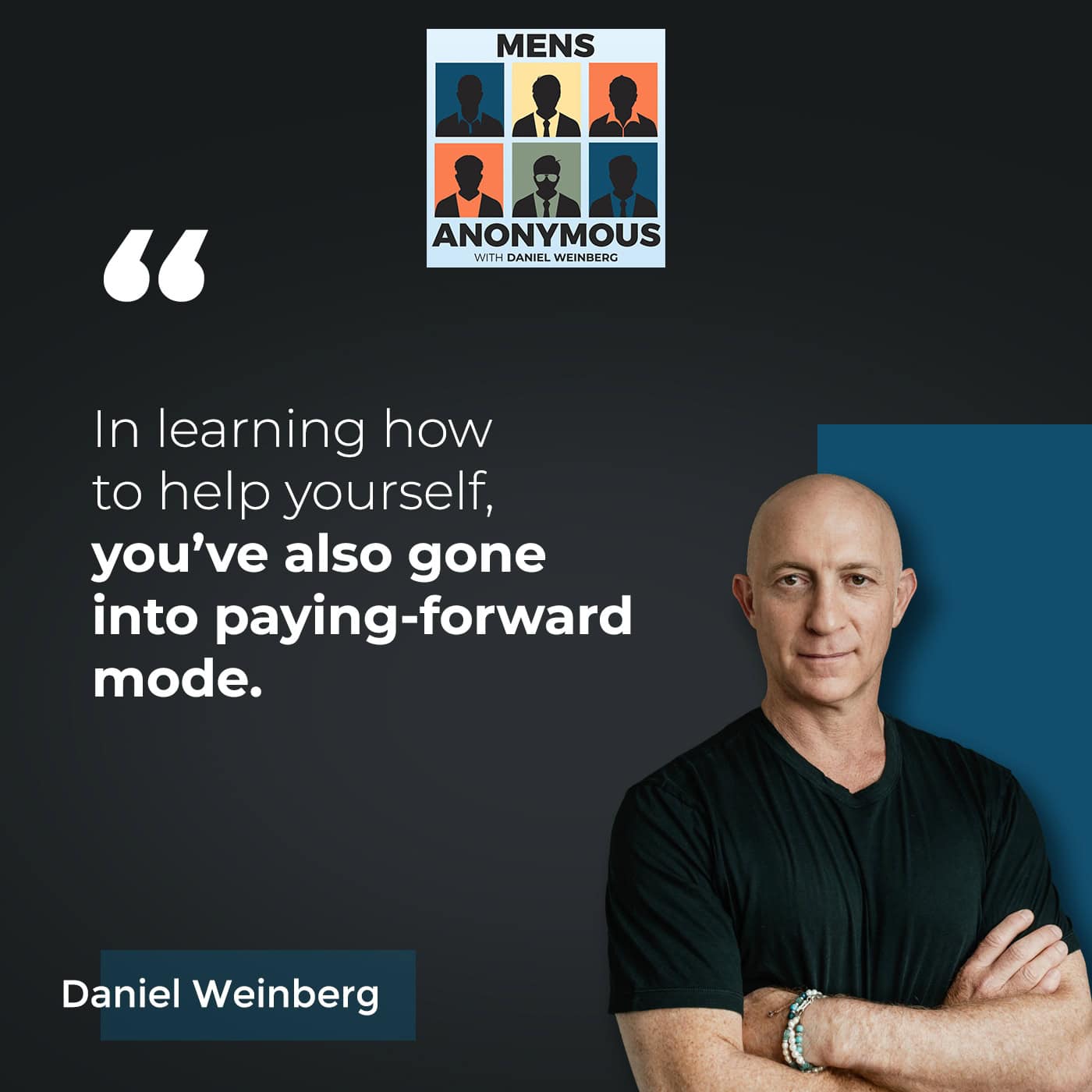
I started having hard conversations with my friends, with boys, and my wife in particular, Sarah, when we were friends. She was probably the most challenging person that I had in my corner. When I say challenging, it’s a person who’s seen beyond the facade, who’s seen beyond the man who cut hair and was holding the space. She’s seen beyond that. When you’ve lived constantly in survival mode, my vice was lying. I would say little white lies to make myself look good or please the person in front of me. I was a yes-man. It’s those things. Sarah had the ability to ask these questions.
I remember one time I was sitting on my computer doing some work, and we were flatmates at the time. She asked me very gently, with the utmost compassion, “Why do you lie? Why do you lie to me? You don’t have to lie to me.” I looked at her. What do you think I said? I covered it up with a lie. I was like, “I don’t lie.” She held her composure and said, “I know you lied.” She started listing out things that I said. I was like, “This person sees me.” When she asked that question with compassion, instead of putting my walls up and being in defense mode, it was my invitation to get real and honest with myself.
It was things like that. I knew that due to my childhood trauma, I had so much baggage that I had to work on. She would encourage me, “Go see a therapist. You need to get help. As your best friend, I can’t be this person who’s always here to listen to you. I’m here. I’m happy to cheer you on. I support you, but this is more than a one-person job.” I did. I started to see a therapist. I started talking to different counselors about my childhood trauma because I needed this freedom.
I thought to myself and I’m emotionally aware that if I struggle with getting honest with myself and struggle with leaning into these hard conversations with myself, imagine how many other men who sit in my chair struggle with this stuff. I knew if I had to be this person who would hold space and lead the way for men to show them and model what healing looks like, I had to do that myself. I’ve found different practices to help myself, breathing techniques, and so many different therapeutic ways that I’ve learned to regulate my nervous system.
Society has painted men to be masculine. But they can also be vulnerable and emotionally aware. Share on XGive us an example.
Breathwork. Physiological sighing is something I use a lot.
What’s that?
You take in a deep breath, breathe in as much as you can, about 100%, hold your breath at the top, and then hold it for a few seconds, and then breathe in again for about 10%, and then release. I do that as many times as I can until I feel my nervous system come back regulated. I’ll often do that before I’m speaking if I’m doing any engagement, speaking, or training with people. I’m a real introvert. I do like my own space. I don’t like crowds. I get a bit anxious when I’m around many crowds, many people. Breathing techniques like box breathing are another thing I do. You inhale for four seconds, hold your breath for four seconds, exhale for four seconds, and hold your breath for four seconds.
You do that again and again until you feel your nervous system regulate. Those are simple tools that I use. The fast tools are conversations, as well as talking. We can talk till the sun comes down, and people still don’t regulate themselves. I’ve learned to have the right people in my corner who I can rely on, talk to, and ask for advice when I’m going through things. I don’t just rely on my wife. My wife is the best person and the best listener that I have in my corner. I have beautiful men who I can reach out to when I’m struggling.
Building A Tribe And Writing A Book
You’ve got your tribe that you’ve created. I love that. I’m all about that. How would you describe your tribe? Who is your tribe? Who are the men in your corner?
My brothers. I’m very fond of my older brother. I have an older brother whom I’ve gone through the wringer with. We’ve had our ups and downs because we share the same trauma. I remember when I first wrote our book, She Is Not Your Rehab, my family didn’t want the book to come out. They thought it was a book of shame and exposing them. When I came to do this work, it wasn’t about shaming. I knew firsthand, in my own lived experience, that shaming did not work. Humiliating did not work. If you want behavior change, if you want people to change, especially men, shaming them was not going to change them. It may sting, it may hurt, it may bring up all those emotions, but it’s not going to change behavior.
If you want people to change their behavior, shaming them will never help. Share on XWhen I wrote the book, I wanted to tell it. I wanted people to read it from a lens of understanding where trauma was birthed from in my own father’s story. The first person who perpetrated violence that I witnessed was my father. I wanted to understand why my father went down that path of chaos and created this hectic childhood that we had. In my discovery of that, I learned that he had lived through trauma. It was this intergenerational trauma that was passed down, and the cycle continued. Writing the book, I wanted people to read it.
It’s a learned behavior.
It’s been beautiful. The men who have read the book and who engage in this conversation finally understand the correlation between their childhood trauma and their behavior. I wanted the book to go into every prison in New Zealand when we worked with Penguin, our publisher. I didn’t want to write a book to monetize or capitalize on my trauma and pain. I wanted it to be an accessible tool.
If you tell a man, “You need to see a therapist, you need counseling,” you’re looking at a $150 session. For most of the men in my community, that’s a whole week’s worth of groceries. My mental health or feeding my family, which one is more important? It’s feeding our families and keeping the lights on. Our mental health takes a back seat. My whole goal in this work is to create accessible solutions for men to take ownership of their childhood trauma and heal. Your childhood trauma wasn’t your fault, but your healing is your responsibility.
She’s Not Your Rehab Book And Platform
It sounds a lot easier when you say it, but in practice, after going through that, I can only imagine the resentment and anger, it’s not fair, and why me? It’s a big leap, as that first step of owning it and going, “It now is up to me.” That’s a pretty big task in itself. You don’t know how I found you or how I stumbled across you. You’ve written the book She Is Not Your Rehab, and you’ve got the platform as well. I’m not a big social media guy but because of doing the podcast and everything, you have to get a little bit more knowledgeable about what’s happening out there.
I was mucking around on Instagram, and I saw this incredible post that you put out there. I encourage anyone to go and look at this reel. What Matt and his wife did was they got thirteen men on a recorded call, and got them to ring their best mate, whoever it was, another male who they’re very close with, to say, “Mate, I wanted to tell you that I love you, and you mean a lot to me.” That pretty much was the brief. I watched this thing, and you put me to tears. These men are big, strong, and masculine. They’re men, and you see them. When you hear the responses from their mate who they called, it would surprise a lot of people.
Also, what you learn from it and the responses. Some of them thought, “What’s wrong? Why are you calling me to tell me you love me? Is there something up? Are you in trouble?” That was either the response, but the majority of the responses, even after that, were all, you could hear their response, and you could hear it in their voice how chuffed they were that their best mate called them to tell them, “Mate, I’m thinking about you, and I want to let you know I love you, mate,” which is not a typical thing that men do for each other.
I have mates who will say, “I love you, mate. Thanks for being there for me.” To get a call to say, “Mate, I was thinking about you, and I want to let you know I love you. That’s it. I don’t have much time to talk, but I want you to know that,” I think it hit a note. It shows you how it doesn’t matter whether you’re a man or a woman, you have those same needs, both to be able to express it, but also, what most men struggle with is to receive it as well. It’s sometimes very hard to hear, “Hey, man, I love you, I think you’re amazing.” It’s too much. I implore everyone to go and get on Instagram, follow She’s Not Your Rehab, and check out that reel because it’s a ripper. Kudos to you, it’s beautiful.
You wrote the book, and then it put you out there. You also did something cool with your son, where you did the Dear Mr. Rock to The Rock, the wrestler. I have his actual name but he’s known as The Rock. That’s also a beautiful clip. Talk me through how you then transitioned to creating a whole platform around anti-violence and getting men to talk and heal, etc. Keep going with this. You wrote the book and got out it there.
I’ve been doing this work for two decades now. I’m 38 years old, and I’ve been working in men’s spaces since I left school, in the barbershop. The barbershop became my hub of research, where I was talking to 20 to 25 men every day. I was cutting hair six days a week and asking these hard questions with men from all different walks of life. I would have men from all around the country, from Australia, come to my city for a haircut to have these conversations.
Have they heard about you? Is that why?
Yes, they heard about me in this barbershop. I’ve traveled the world, cutting hair and doing tutorials in the hair industry. I was quite well-known in the hair industry for my barbering skills. I was passionate about these vulnerable, courageous conversations with men. We started running these group therapy sessions in the barbershop because I thought, “Who is helping my community?” I remember putting up a post on Facebook, “We’re running a group therapy session.”
I reached out to an organization here. I said, “Our men can’t afford therapy. Can any of your counselors offer free therapy if I can get men in the room?” This organization, Aviva, said, “We’re struggling to get men in the room. We have women coming in who are asking for help, it was a family violence service. We can’t engage men. If you can get men in the room, we will happily give free counseling sessions.” I put up a post on Facebook. I remember a week before our session, my wife and I got to our barbershop to put the chairs out for our group therapy session.
To my shock, there were close to 100 men outside our barbershop. That told me that men do want to have these hard conversations. It’s just where is it safe enough for me to come and unload and talk about these things? The men in my community knew that I had been doing this for years, so they found my barbershop safe. It was a place where they could come and talk.
After doing it for a couple of years, I then got offered to do a TED Talk. It’s called The Barbershop Where Men Go to Heal on YouTube. When they approached me, I thought to myself, “I’m just a barber. What can I share?” I married a strong woman who encouraged me to get my ass out there and tell my story. That was the launch of She Is Not Your Rehab. I talked about it there how men need to stop using our women as rehabilitation centers. They’re our cheerleaders, they’re our greatest supporters, but we need to take responsibility and ownership of our own healing because what we do not transform, we will ultimately transmit to those whom we say we love the most, our women and our children.
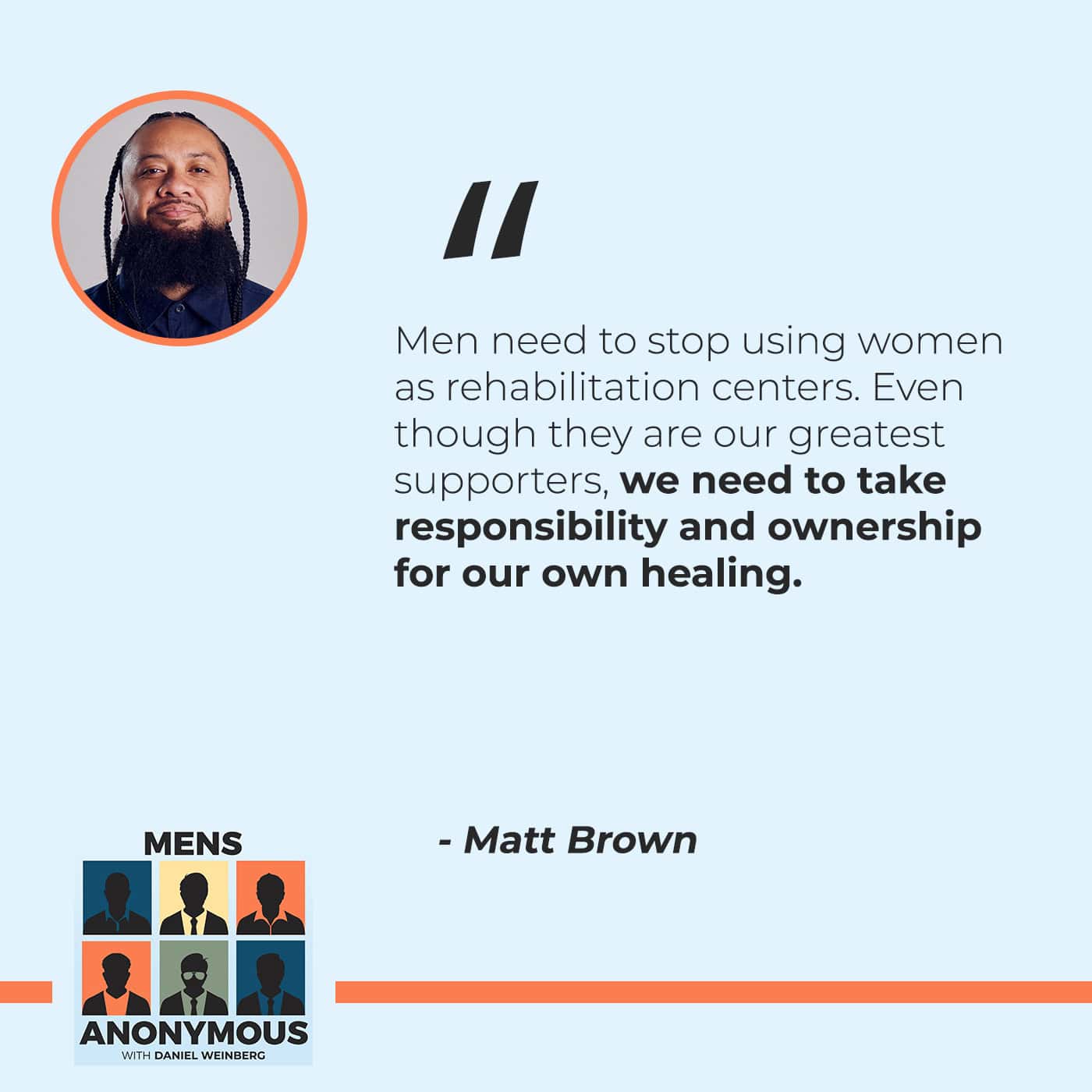
This talk blew up. Penguin approached us. We wrote the book. I wanted it in every prison. We got it into every prison. Every person incarcerated in 2021 received a book for Christmas. There are about 9,500 people incarcerated in New Zealand. Our country is a small country of 5 million people. That took off. It opened the door to so many opportunities.
I was working in the barbershop full-time while I was going around speaking and talking about violence prevention and mental health. I thought to myself, “I can’t do this. I can’t juggle this all.” My greatest passion in life is to be a dad. My work was taking me away from what I love the most, which is my children. I had to make the hard decision to close our barbershop down in 2023 and pursue this full-time.
What I do now is work with different agencies around the world, organizations, frontline police officers, and social workers. I thought to myself that I need to work with those who are working with our communities on how to best engage with men in our communities. I can’t work with all the men in the community, but I can work with those who are helping our communities. My wife and I created a few programs and strategies on how to engage men properly in different communities.
Where have you done that around the world?
Heaps of countries. We were in the UK, and in the EU for about six months or five months last year. Many places. We’ve done India. I’m off to Thailand.
For example, you went to India. What was there?
The New Zealand embassy, we got invited there. We worked alongside different organizations that are fighting human trafficking, family violence, and mental health. These are places where it’s very taboo to talk about vulnerability or family violence. When I was in France, they were gobsmacked that a man was talking about or sharing his story of being a victim of sexual abuse. I stood there and owned my story as a young kid who remembers being groomed and touched by a family member. Going on this path of forgiving, not to condone what happened to me, but releasing and forgiving, so I don’t transmit their anger and their bitterness to those whom I love the most, my children, and my wife.
This conversation was new to a lot of people and a lot of countries that I’ve visited. I see it as an honor. We need to start having these conversations because, in my experience, sitting and talking to men for the last twenty years, not having these conversations was destroying us. Not talking about these emotions and these feelings that we have been taught to suppress, to get over, and to swallow a pill is not working for us. If anything, it’s working for the system. We’re building more prisons and more women and children are dying at the hands of violent men and dysregulated men.
How Men Heal And Become Better People
The men that you have engaged with in this type of process, have you seen the positive outcomes? Tell us what you’ve experienced. You’ve done many groups. Give me some examples. I’m trying to highlight it for the audience because we talk about how good it is. It’s always nice to hear stories of how good it is in practice. Given that you’ve spoken to lots of different men, can you recount any stories, top of mind, where you know this gentleman went from this situation to where he is now because he’s doing the healing that he did?
One story that comes to my mind straight away is a young man named Liam, who came into my barbershop, and we got talking. First, I started sharing with him my journey. It was his first time for a haircut in my space. He was very quiet and shut off. I started asking him questions, “What was your upbringing like?” He talked about his father, who was addicted to alcohol. Alcohol was around his whole childhood.
I started sharing my story of my father being an alcoholic. He looked up at me and said, “I’m here because I’ve been struggling with my mental health. I had planned for this haircut to be my last haircut.” I’m like, “What do you mean your last haircut?” He said, “This haircut is the haircut for my funeral.” When he said that, so much emotion came over me, and I started crying. I apologized. “I’m so sorry that you feel this way.”
He started crying. All I could do was grab and hug him while he was sitting in my chair. I remember him walking out of my shop, turning around, and looking at me. He said, “Thank you so much for seeing me tonight.” I knew he wasn’t talking about seeing him and putting him in for a haircut. It was seeing him beyond the man who came in, seeing him and seeing his pain. That was over a decade ago.
I sat with Liam. He’s now living in Australia. He has two beautiful children, married to the love of his life. He’s a PT and owns a gym over there in Australia, in Melbourne. He’ll message me when he sees my work online. He gives out my book to anyone he can in the gym. He’s having these conversations. He’s now running group therapy sessions in his gym, holding space for other men. You’re seeing that trickle effect.
I’m seeing a shift in the culture of men. You can be a man who goes to work, who works hard and trains and a masculine man whom society has painted us we should be, but then you can also be tender, vulnerable, and emotionally aware. Emotional intelligence is as important, and it should be as important, if anything, more important, living in the climate that we live in now.
The Global Issue Of Violence
If I were to compare now to the way you see that society in New Zealand, how different would it be from what it was like in Once Were Warriors? Has there been a big shift in general, or does it still permeate the culture?
Violence is still present. In Australia, not long ago, a Kiwi lady was tragically lit on fire while she was asleep by her Kiwi ex-partner. They were both living in Brisbane. Violence is still happening. In Australia last year alone, we lost 101 women to the family violence of a partner or person that they knew. Domestic violence is a massive global issue.
I wouldn’t say we’re getting better there, but I would say we are getting better at having these hard conversations. More things are now coming to light. People are braver to have these conversations and to talk about this. People are calling it out. I feel men are calling this behavior out more. We need more men in this space calling this bad behavior out. For too long, we’ve shut down. We’ve been bystanders who don’t say anything. Where I grew up, my neighbors never rang the police. They saw the violence and they heard the violence, but no one ever spoke up.
People knew that violence was happening all around them, but no one dared to speak up. Share on XPeople saw my mum with black eyes at church, but no one ever came up to us and asked us, “What is happening?” No one came and looked after us children. We had to fend for ourselves and navigate this life as young children. We took it upon us. I came from the belief system that it was my job to look after Mum. It was my job to protect Mum from Dad. That’s no child’s responsibility.
All About The Inner Boy App
You’ve also created an app. It’s called the innerBoy app, is that correct?
Yes. We live in an online space now. Here in Aotearoa, New Zealand, 94% of our country is online. About half of that is online all the time. I thought this is where we need to be. If we’re to help people heal and take responsibility and ownership of their healing, we need to be in a space where people are. We decided to create innerBoy, an online platform app, making it accessible to people. It’s free. Our government funded the first stage of it. We wanted it to be free for people. They can access that. It’s a 30-minute for 30 days program online. We jump on there and do it. We wanted it to be easy and accessible for men. Our first evaluation research has come out for the first year, and it’s been amazing. It’s been beautiful.
If you do the course, what’s a man going to get out of it? Explain to me the learnings you’re going to get out of the practices or the habits.
These different tools in there, diving into things like anger, how to utilize anger for good instead of being detrimental to your family and yourself, and how to regulate your emotions when situations of conflict arise. The best approach to it, maybe it’s walking away, and having a conversation with your partner. When things get heated, can we put this on the shelf and come back to this? We will come back to this. It’s not me ignoring it and shutting it down and talking about it and going to sleep angry. Let’s pack this up. I need to go and process what’s happening. Things like that. Tools that we wanted to teach. These are tools that work for me, sitting in therapy for two decades now. We’ve worked post-therapy.
Do you still do therapy?
Yes. I’m a believer in don’t go see a therapist when shit hits the fan. Life is hard. You want to go and have these conversations with a therapist or friends so you have more tools in your bag and your toolkit because when shit does hit the fan, you can then pull them out. I have the right tool available at my disposal. Thirty minutes for thirty days. My daughter, our oldest girl, Oceana, who is 22 is a fine arts student here at the University of Canterbury. She’s done all the artwork.
There are activities in there for men to watch and sit with themselves and see what the image brings out of them. There’s one image that stays close to my heart. It’s an image of a father with his son on his lap, and he’s about to smack him. If you look at the image closely, the father has scars on the back of his hand. That explains intergenerational trauma. The cycle carries on.
That day is called Cycle Breaker. We’re teaching men how to break cycles. You can be the cycle breaker. It’s putting the ownership on us as men. It is hard like you said before. That is quite a scary thing to take ownership and take responsibility. Who’s going to come and do the job for us? It’s not our partner’s job. It’s not our children’s job. It’s not the government’s job. We need to take responsibility for our own healing.
Answering Rapid-Fire Questions
Before we finish off, I’m going to ask you a series of questions I ask all my guests. They’re like quick-response questions. I want to hear how you answer these. The first one is who would you like to say sorry to, given the chance?
The first person that comes to my mind is my mother. My dear mum passed away a couple of years ago. She lost her battle with cancer. I would say sorry for many things. I feel not protecting her enough. Not believing her enough. That’s a question that my dear wife, Sarah, would always challenge me on. “You guys are so abrupt and short with your mum, but when it comes to your father, you guys are gentle. You guys are quiet.”
When I look back at that, it was probably because we were scared of our father. Our father ruled the household with an iron fist. My mother was the safe space, our safe place. We could talk about anything with my mum. She unfortunately became the punching bag not just for my father physically, but for all of us. We would lash out, “You didn’t protect us, Mum.” I would say sorry to my mum for not believing her and laying all our worries and troubles on her. I also had the understanding that we just were children. We were traumatized children. I would apologize to my mum.
What are you proud of being or doing in your life?
I am proud of breaking the cycle. I’m proud that I walk through the door after work and my children run up to me, fighting over who’s going to get the first hug. I don’t ever recall being that way towards my dad.
Have you ever made amends with your dad?
Yeah, 100%. It’s part of this job. I knew when you’re working with men, you had to be real about this work. You’re going to be called out. You’re going to be challenged. When you work with men, men know when you’re a fake. Men know when you’re real and when you’re not. I knew that to do this work, I had to go down that path of talking and having these hard conversations with my father.
In that journey of learning, my father is a very traumatized individual. I’ve forgiven him. N not for his sake but for my sake. As I said earlier, if I hold on to the anger and bitterness, it will be passed down to my children. It doesn’t condone the violence or what happened to us, but it released me to be the best father that I can be.
When do you receive kindness while needing it most and expecting it least?
My wife. Straight away. The first thing is how she approached me or challenged me on my lies. “Why do you lie?” She wasn’t attacking me, but it was an invitation to be better.
That’s cool. What did your mother or father teach you that you frequently remind yourself of?
Hard work. That no one was going to come and rescue us. No one is going to come and change my narrative. It was all on me. Hard work. I watched my parents slave away as immigrants who came to New Zealand from the islands, from Samoa, and worked hard my entire childhood. That’s something that for my parents, I will forever be grateful for. Working hard.
The final one, which I’m very intrigued is, what is your superpower? It sounds like you have quite a lot of superpowers. Give me what you think your superpower is.
I think being vulnerable. People sometimes challenged me, “Matt, you’re used to being vulnerable.” I don’t think you ever get used to being vulnerable. You’ve learned and you make friends with it. Vulnerability is uncomfortable. You make friends with the fact that vulnerability is going to bring anxiety, sweaty palms, and your stomach rolling. I think that’s been my superpower. It’s been this doorway for other men to step through and be vulnerable themselves.
When they see a masculine man who’s lived through trauma, who’s come out the other end and is now compassionate and loving to his wife, has a healthy relationship with his wife, has children who love him and adore him, wants to be in his life, I think that’s been my greatest superpower, is owning my story in its entirety and being vulnerable with it. When I say vulnerable, me sharing my story of abuse, sexual abuse, I’m up for the audience to critique me and say harsh things. That comes with the territory of being vulnerable. You’re opening yourself up to being critiqued and criticized.
Being vulnerable means opening yourself up to be critiqued and criticized. Share on XEpisode Wrap-up And Closing Words
I’m not going to critique. I’m going to say thank you. You certainly warmed my heart. It’s hard to explain, but it’s a beautiful energy and very calming talking to you and listening to you. I want to thank you for coming on the show, but I want to thank you for doing the work that you’re doing because it’s incredibly important. It’s much needed, but also that you’re having a big impact. Congratulations. I’m going to keep following you and your journey. I wish you and the whole platform lots of fortune in the future. Hopefully, we stay in touch. I appreciate it.
Thank you for having me. I appreciate it. It was lovely to talk to you. Thank you for listening to me waffle on.
We’ll talk soon. Thanks.
Thank you.
Important Links
- Matt Brown on LinkedIn
- Sarah Brown on LinkedIn
- She Is Not Your Rehab
- She’s Not Your Rehab on Instagram
- She Is Not Your Rehab: One Man’s Journey to Healing and the Global Anti-Violence Movement He Inspired
- Aviva
- innerBoy
About Matt Brown
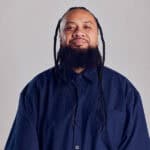 Taimalelagi Mataio Faafetai (Matt) Brown, is a New Zealand born Samoan author and renowned communicator who works to eradicate domestic violence by supporting those who perpetrate violence, to heal. A survivor of family violence and childhood sexual abuse himself, he originally started his domestic violence advocacy work by sharing his story with the men who frequented his busy barbershops as a way to foster vulnerability, healing, and connection.
Taimalelagi Mataio Faafetai (Matt) Brown, is a New Zealand born Samoan author and renowned communicator who works to eradicate domestic violence by supporting those who perpetrate violence, to heal. A survivor of family violence and childhood sexual abuse himself, he originally started his domestic violence advocacy work by sharing his story with the men who frequented his busy barbershops as a way to foster vulnerability, healing, and connection.
Matt believes his true calling lies in his work to redefine societies view of masculinity and to help end the cycle of domestic violence plaguing families all over the world.For over a decade Matt has hosted free men’s anti-violence support groups from locations like barbershops, construction sites, gang pads, prisons and indigenous spaces. He has facilitated multiple programs inside men’s and youth prisons and was named a Corrections NZ patron in 2020.
A New Zealand Māori (Ngāpuhi/Te Rarawa) wāhine, Sarah is a writer and producer who is passionate about the mandate of ‘creating violence free communities’ and has worked alongside Matt to re-define the way we communicate about family violence with creativity and innovation. Since 2018, Matt and Sarah have partnered with the NZ Ministry of Social Development as ambassadors for their ‘It’s not OK Campaign’ and were funded to develop and launch an app; innerBoy to promote accessible healing for indigenous men. Together the couple co-founded She Is Not Your Rehab and launched the concept in Matt’s 2019 TEDx talk. Matt says the movement is an invitation for men to acknowledge their own childhood trauma and to take responsibility for their healing so that they can transform their pain instead of transmitting it on those around them.
The couple released their first book; a NZ #1 Bestseller; She Is Not Your Rehab with the goal to encourage intergenerational healing in 2021, raising $100k and donating 10k+ copies of the book to all NZ prisons; to every person incarcerated and launched a book club program inside prison. In November 2022 they opened the She Is Not Your Rehab art gallery in Christchurch, NZ and a virtual gallery online which hosts the exhibition; ‘Who is She?’ in collaboration with Mr G; an acclaimed NZ graffiti artist.
In 2023, the couple launched innerBoy, their first mental health tech product for supporting men in healing from intergenerational trauma. It is a free and accessible app available to men nationwide. It was later released in Australia in 2024. She Is Not Your Rehab also launched Love U Bro Day in 2024. Every year on September 6th Love U Bro Day aims to spark important conversations around men’s mental health – birthed in empathy and love. During the 2024 campaign, over 17 million people were reached via the viral online videos for Love U Bro Day.
Both Sarah and Matt became members of the New Zealand Order of Merit in 2022 and were awarded a Commonwealth Points of Light award by Her Majesty Queen Elizabeth II, as Head of the Commonwealth before she passed.

